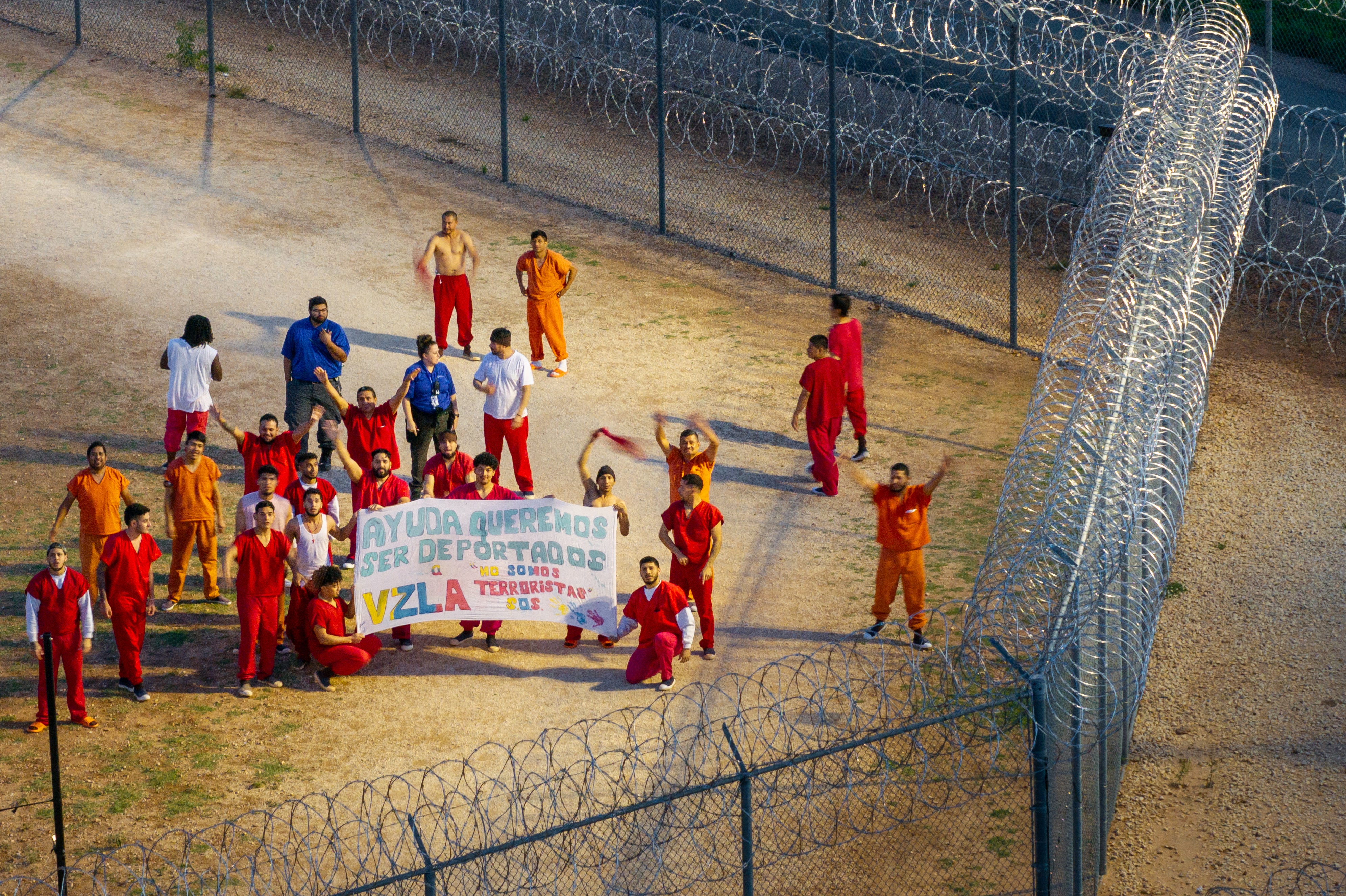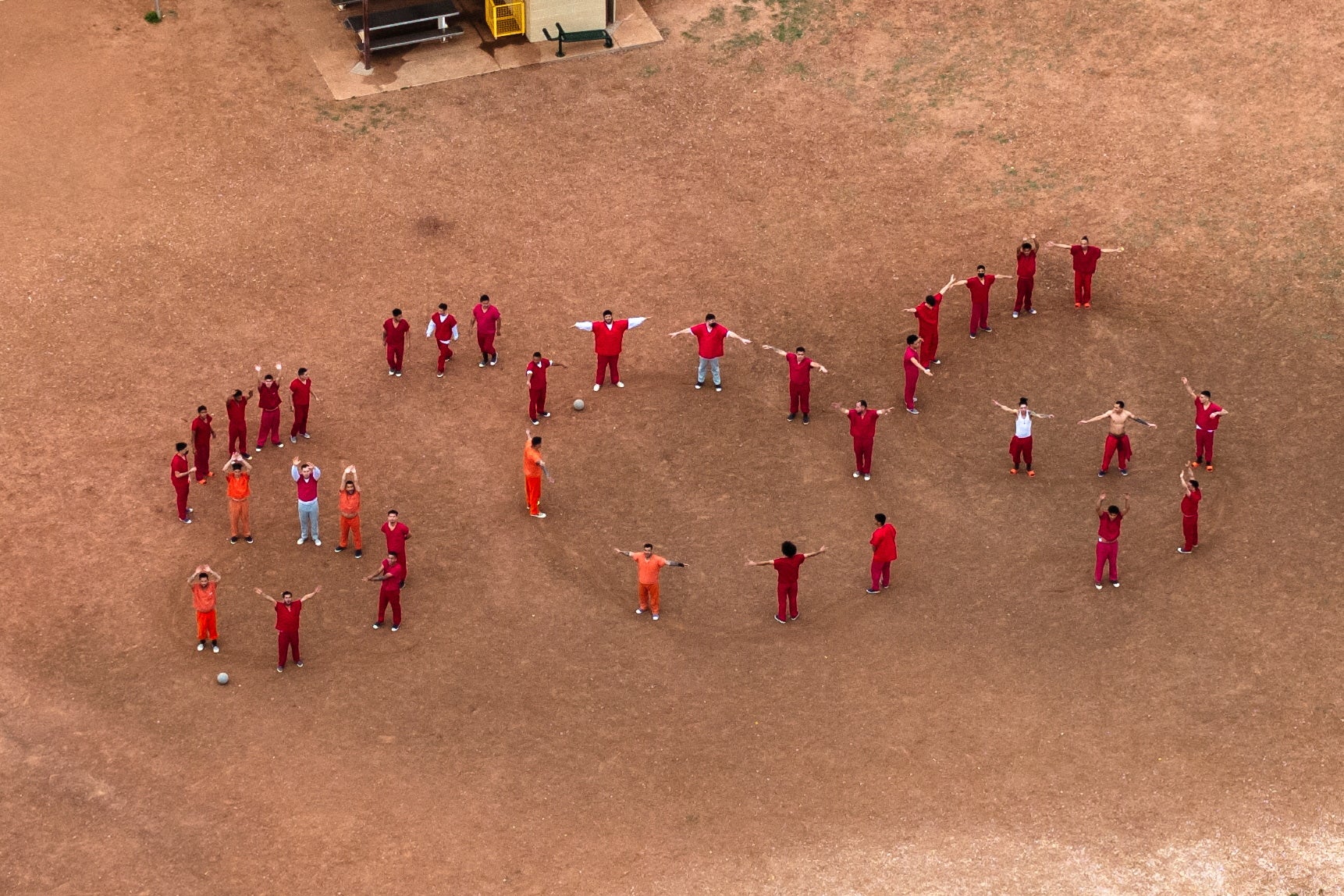ARTICLE AD BOX
In its latest demand to the Supreme Court to begin swiftly deporting immigrants from the United States, Donald Trump’s administration claims a group of Venezuelan men imprisoned in Texas tried to barricade themselves inside their unit, covered surveillance cameras and threatened to take hostages.
A group of 23 men the administration accused of being Tren de Aragua gang members “have proven difficult to manage,” according to a sworn statement in court documents from an Immigration and Customs Enforcement official.
In an incident on April 23 that has not previously been reported, the men allegedly “refused their breakfast trays and barricaded both the front and rear entrance doors of their housing unit using bed cots” and “covered the surveillance cameras and blocked the housing unit windows.”

They “threatened to take hostages and injure facility contract staff and ICE officers” and “attempted to flood the housing unit by clogging toilets,” according to Joshua D. Johnson, acting ICE director for the Dallas office.
On May 4, those 23 men were moved from the Bluebonnet Detention Facility in Anson to the Prairieland Detention Center in Alvarado — under a different court jurisdiction that immigrants’ right attorneys say is more favorable to the Trump administration.
In its filing on May 12, the government argues that the alleged incident reveals the “dangers” posed by Tren de Aragua members while in detention rather than summarily deporting them.
The episode follows only a few public glimpses into the lives of the immigrants detained at Bluebonnet, where drone footage from Reuters captured a group of men in red prison jumpsuits — which designates them as high-risk inmates — spelling out “SOS” with their bodies.
Another image captures a group holding up a sign that reads, in Spanish, “Help, we want to be deported. We are not terrorists.” The sign says “VZLA,” a reference to Venezuela, and suggests they are pleading with authorities to avoid their imprisonment in El Salvador’s Terrorism Confinement Center, or CECOT, labeled by human rights groups as a “tropical gulag” and concentration camp.
A lawyer for the ACLU representing immigrants in detention declined to comment.

Nearly two months after deporting dozens of Venezuelan immigrants to the Salvadoran prison, the Trump administration is embroiled in courtroom battles across the country — and at the nation’s highest court — following challenges to the president’s use of the Alien Enemies Act to rapidly remove alleged gang members from the country.
The Supreme Court has issued two orders stemming from those cases. Justices agreed that the president could rely on the centuries-old wartime law to remove immigrants from the country — provided they first have an opportunity to challenge those claims in court. The justices also temporarily blocked the government from deporting a group of Venezuelan immigrants in Texas while their lawyers scrambled to challenge the allegations against them.
In his proclamation invoking the Alien Enemies Act, Trump stated that “all Venezuelan citizens 14 years of age or older who are members of [Tren de Aragua], are within the United States, and are not actually naturalized or lawful permanent residents of the United States are liable to be apprehended, restrained, secured, and removed as Alien Enemies.”
But the administration has admitted that “many” of the 137 Venezuelans deported to El Salvador in March did not have criminal records, and attorneys and family members say their clients and relatives — some of whom were in the country with legal permission and have upcoming court hearings on their asylum claims — have nothing to do with Tren de Aragua.
Under the terms of the Alien Enemies Act of 1798, the president has authority to remove immigrants during a “declared war” or if there is an "invasion” or “predatory incursion” by “any foreign nation or government.”
Several federal judges — including a Trump appointee — have said the president’s use of the Alien Enemies Act is unlawful, and wrongly uses immigration as an excuse to subvert the plain readings of war, invasion and predatory incursion.
A recently uncovered intelligence memo from the Trump administration also denies any link between Nicolas Maduro’s regime and Tren de Aragua, noting that the intelligence community has “not observed the regime directing TDA, including to push migrants to the United States, which probably would require extensive coordination and funding between regime entities and TDA leaders.”
Lawyers for detained immigrants told the Supreme Court last month that the administration is failing to provide adequate notice of their removal, and “comes nowhere near” satisfying the court’s order.
“Whatever due process may require in this context, it does not allow removing a person to a possible life sentence without trial, in a prison known for torture and other abuse, a mere 24 hours after providing an English-only notice form (not provided to any attorney) that gives no information about the person’s right to seek judicial review, much less the process or timeline for doing so,” attorneys wrote.









 English (US) ·
English (US) ·